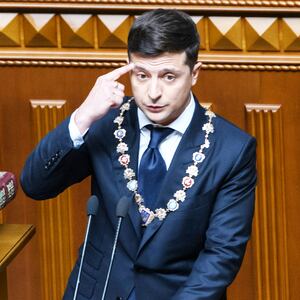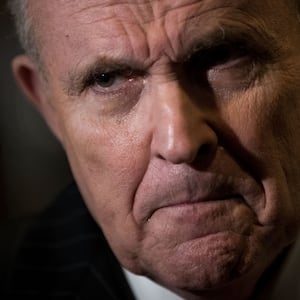KYIV, Ukraine—Like a happy teen—and much to the surprise of his bodyguards—newly elected Ukrainian President Volodymyr Zelensky jumped into a fountain last weekend as his tour of war-torn Ukraine’s eastern region promised to become historical, if not hysterical.
In the city of Mariupol, not far from the front lines, a flock of local kids followed the president in his soaking wet suit as he sprinted among jets of water.
You don’t see many top officials in post-Soviet countries horsing around with kids like this. Actually, you wouldn’t have seen any before Zelensky, the former TV comedian who played an accidental president only to be elected for real in May, and by a landslide. Witnesses said the scene was like a “medicine” for people in the strategic port city, which has buried hundreds of civilians and soldiers in the past five years of war.
Just a few weeks ago the 41-year-old Zelensky won his office by declaring he was a tough leader coming to break the old molds in Ukraine’s domestic and foreign policy, and since the day of his inauguration the list of radical decisions has been growing. Zelensky dissolved the parliament and sent a clear message to Moscow about its incursions in the east of the country since 2014: both “Donbass and Crimea are Ukraine,” he declared unequivocally, even though Russian President Vladimir Putin has annexed Crimea.
Zelensky quickly fired Ukraine’s top officials, appointing instead young, reliably loyal friends of his to the key positions.
His critics said that it was a new style of cronyism, doubting that his new people with little or no experience in public office could handle important decisions, expose billion-dollar corruption, and investigate dozens of murders committed during the Ukrainian revolution of 2014, as well as other major crimes. But Zelensky continued to appoint people he could trust.
Zelensky has defined two wars in Ukraine, “the war with Russia and the war with corruption.” During his meetings in France and Germany this week, Zelensky focused on ending the war in Donbass and bringing dozens of Ukrainian prisoners back home. If that did not work, he called to expand the mechanism of sanctions against Russia. “The strategic course of Ukraine to achieve full-fledged membership in the E.U. and NATO, which is secured in the constitution of Ukraine, remains unchanged,” he said at a meeting with NATO Secretary General Jens Stoltenberg earlier this month.
The war on corruption promises to be tough and long. Last month in a Delaware court Ukraine’s Privat Bank filed a suit against Zelensky’s longtime business partner, Ihor Kolomoisky, for “hundreds of millions of dollars,” accusing the oligarch of “unjust enrichment” in “a series of brazen fraudulent schemes.”
Ukraine’s first lady, Olena Zelenskaya, admitted to The Daily Beast that her husband was upset about the accusations against his former business partner, the patron of the television network where he made his fame. But she insisted that President Zelensky was independent from the oligarch. “Volodymyr is never going to be anybody’s puppet,” she said.
In spite of recommendations from Washington’s special envoy for Ukraine, Kurt Walker, Zelensky appointed his 42-year-old aide on legal issues, Andrei Bogdan, to be head of the presidential administration. He made his childhood friend, Ivan Bakanov, the acting head of the SBU, the Security Service of Ukraine.
It is still a question when, if ever, Zelensky is going to negotiate peace with Russian President Vladimir Putin. Moscow has made it clear that it will not accept Ukraine integrating fully with the E.U. and NATO, and for now Moscow is accusing Ukraine of “aggression.”
On Thursday the editor-in-chief of Russia Today, Margarita Simonyan, said that Ukraine had conducted a denial of service attack on Moscow’s call center for Putin’s annual question and answer session.
In a gesture respected by many in Kiev, Zelensky did not welcome attempts by Donald Trump’s lawyer, Rudy Giuliani, to politicize Ukraine’s investigations of former Trump campaign chairman Paul Manafort and, in a separate case, former Vice President Joe Biden’s son, Hunter Biden.
Yuliya Mostovaya, editor of Mirror Weekly and a wise analyst of Ukraine’s politics for three decades, told The Daily Beast that Zelensky is still enjoying “the lightness of being” with no memory of Soviet, post-Soviet, or even post-revolutionary intrigues in the government. “Yes, maybe he does not realize the scale of responsibility, yet, but to every splash of criticism I want to say, ‘Maybe that’s the way to do it.’”
After the Giuliani episode, says Mostovaya, she understands Zelensky’s desire to keep Ukraine from being “crushed between the millstones of America’s 2020 presidential election; his priority now is to figure out the piles of issues at home.” But, she cautioned, “Trump’s allies will not give up their attempts to drag Ukraine into their political game.”
Without thinking much about consequences, Trump’s lawyer named Kyiv politician Serhiy Leschenko one of the “enemies of Donald Trump”—a serious accusation targeting one of Ukraine’s most articulate democrats.
Leschenko notes that Giuliani was working with Prosecutor General Yuriy Lutsenko, whose dismissal has been announced by Zelensky and “who’s been lying to Washington.” The claim about Joe Biden is that he asked for a case against Burisma Holding to be closed. Biden’s son, Hunter, served on its board. “That is not true,” Leschenko told The Daily Beast. “It was Lutsenko who closed the case, himself. Lutsenko has also been lying to Giuliani about the ‘fraudulent’ corruption case against Manafort.”
The Giuliani affair was outgoing President Petro Poroshenko’s “legacy” for the new team in power, Mostovaya said. “First Poroshenko thought he could make some political capital by dragging Ukraine in the U.S. politics on the Democrats’ side, then backing Trump in order to silence American financial intelligence here in Ukraine and save his own capital and freedom.”
There are indeed layers of issues in the legacy handed to Zelensky.
One of them is the debate about the state language, a beloved topic for Russia’s propagandists, who blamed Poroshenko for welcoming bans on Russian-language culture, making it a cornerstone of the artificially created conflict in Donbass.
In one sweeping statement, Zelensky liberated his people from tensions around that issue: he spoke Russian in Mariupol, the language majority of people speak in eastern regions of Ukraine. “You are the city of great warriors, great people, great Ukrainians,” he told his audience there last weekend. “To be honest, it does not matter to me what language you speak, you are always Ukrainians, we all understand each other; I am convinced that no propaganda will ever influence you and me.”
Local businessmen and activists met with the president to see if he was a man of action, not just of big words. Galina Odnorog, a local politician and entrepreneur, had a chance to speak with Zelensky in her usual straightforward manner, rolling out a problem after problem.
“Zelensky’s eyes widened when I told him that Mariupol cannot provide its own bread for our citizens, thanks to the corrupt schemes in law enforcement agencies,” Odnorog told The Daily Beast. “He immediately ordered Interior Minister Arsen Avakov to help me solve the problem.”
Odnorog said she had tears in her eyes when she saw her country’s president, soaking wet, playing with local kids in the fountain. Since 2014, Odnorog, a volunteer leader, has been providing food and ammunition for soldiers on the front lines, medicine for wounded in the hospitals.
“I was amazed to see how easy it was to deal with Zelensky,” she said. “Of course his critics and opponents are not going to let their grip go easily. We’ll see if his ministers fulfill his orders. But for now we want to celebrate the moment: it feels like Zelensky is a healer of our wounds.”







